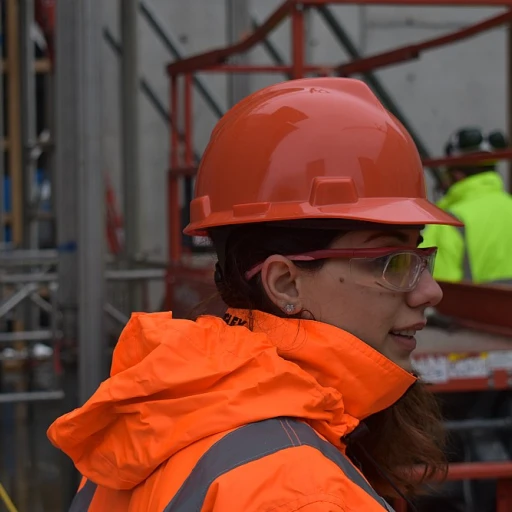
Understanding Candidate Experience
Exploring the Essence of Candidate Experience
Candidate experience is a vital aspect of recruitment, influencing not only the decision-making process for candidates but also the reputation of organizations within the nonprofit space. It encompasses every interaction a prospective candidate has with an organization, from the initial job posting to the final interview. As the philanthropic landscape continues to evolve, nonprofits are increasingly recognizing the importance of crafting a positive and engaging experience for candidates, a point underscored by its impact on their ability to attract and retain mission-focused professionals. In the competitive environment of nonprofit jobs, especially within regions like Missouri and Louis, enhancing candidate experience is crucial in maintaining a strong talent pipeline. Nonprofits, such as Rome Group, are prioritizing this aspect to fill open positions effectively with qualified professionals who align with their mission and values. Understanding what candidate experience entails helps nonprofit organizations plan their recruitment strategies, ensuring transparency, open communication, and respect for candidates' time and efforts. This encourages a stronger connection with candidates, attracting those who are passionate about nonprofit careers and dedicated to making a difference. A well-structured experience can often be the deciding factor for candidates when choosing to join an organization. For further insights on strategies to enhance candidate experience across various sectors, including nonprofit organizations like Rome Group, you can explore pre-hire strategies to create a more engaging recruitment process.Challenges in Candidate Experience
Obstacles in the Hiring Process
The landscape of candidate experience in the nonprofit sector, particularly in Missouri and the surrounding regions such as Saint Louis, presents unique challenges. One notable issue is the competition for qualified professionals within the limited pool of nonprofit job seekers. As organizations vie for top talent, the scarcity of mission-focused individuals ready to make a significant impact in nonprofit careers becomes apparent.
Another hurdle is the complexity of nonprofit job postings. Jobs in these organizations often require diverse skill sets, and the job descriptions can be intricate, leading to confusion among applicants. Coordinators and officers tasked with posting on platforms like the Rome Group job board sometimes struggle to convey the precise requirements and expectations for open positions, affecting applicants' ability to determine their fit.
Additionally, the application process itself can be daunting and time-consuming. While a solid online presence and efficient digital interfaces are crucial, many nonprofit organizations still rely heavily on traditional, manual procedures that can hinder quick application submissions. This becomes particularly concerning for smaller organizations with limited office resources.
The philanthropic landscape also poses privacy concerns. Candidates are increasingly wary of how personal data is handled. In an era where privacy policies and data protection are paramount, ensuring that these elements are transparently communicated is critical.
To gain further understanding of how similar issues have been approached, a useful resource to explore is the blog on effective workplace profiles for enhanced candidate experience. It offers insights into crafting clearer communication strategies to avoid misunderstandings in job postings and applicant expectations.
Strategies for Improvement
Strategic Approaches to Elevating the Experience
In the mission-focused landscape of nonprofits, enhancing candidate experience plays a pivotal role in attracting top talents. Recognizing and addressing the challenges is only half the battle. The Rome Group, with its steadfast commitment to Philadelphia's philanthropic landscape, provides a roadmap for improving this crucial aspect. One key to success lies in refining the process of job postings and job openings. Clear and concise listings on the job board can set the tone for candidates' interactions with organizations. Whether you're looking at nonprofits in Missouri, Louis, or beyond, transparency about the role's responsibilities and qualifications fosters trust and sets realistic expectations. Nonprofits can leverage insights from the group's newsletter nonprofit for innovative job description formats and job openings announcements. In creating engaging posts, organizations should focus on authenticity. When public affairs and social impact are central to your mission, highlighting these values in your communications attracts likeminded professionals seeking a nonprofit career. Whether through the Rome Group's insight newsletter or community foundation initiatives, aligning your message with your mission strengthens appeal. Implementing a systematic communication strategy ensures candidates are informed throughout the process. This could involve appointing a coordinator to manage updates or leveraging technology to automate this aspect. Strategic use of emails or social media platforms can keep candidates engaged and informed about open positions and the progress of their applications. Additionally, incorporating feedback mechanisms into the application process offers a dual benefit. Candidates feel heard and respected, and organizations gain valuable insights into potential areas for improvement. Whether through direct surveys or integrating privacy policy compliant feedback systems, the responsiveness of an organization can significantly impact how it is perceived in the nonprofit space. Strategically addressing these elements, nonprofits can not only enhance candidate experience but also advance professional development within their offices. By establishing a thoughtful, structured approach to the recruitment process, the Rome Group exemplifies the elevation of candidate experiences, reinforcing its role as a leader in nonprofit career advancement. For more tips on optimizing your resume to make a powerful impression, check out this comprehensive guide available here.Technology's Role in Candidate Experience
Leveraging Technology to Optimize Candidate Journey
In the modern recruitment landscape, technology has become a vital asset in enhancing the candidate experience, especially for organizations like Rome Group, which operates within the nonprofit sector across Missouri and beyond. The implementation of the right technological solutions can streamline processes, making jobs and job applications more accessible, transparent, and engaging. One significant advantage technology offers is the improvement of job board functionality. For nonprofits like those associated with Rome Group, an efficient and easy-to-navigate job board can greatly facilitate the search for nonprofit job opportunities in the St. Louis area. By optimizing job postings on such platforms, professionals can readily find open positions aligned with their skills and career aspirations within the nonprofit space. Additionally, these job boards can incorporate features to filter jobs, allowing candidates to find nonprofit career paths that resonate with their mission-focused goals. Furthermore, the integration of applicant tracking systems (ATS) can enhance the candidate experience by reducing bottlenecks in application processing. An effective ATS helps manage job applications efficiently and can assist coordinators and hiring officers in swiftly identifying suitable candidates, which is crucial for managing high volumes of applications common in nonprofit settings. Technology also plays a significant role in communication. By utilizing email automation and insights newsletters, organizations can maintain consistent communication with candidates throughout the recruitment journey. This not only keeps candidates informed but also makes them feel valued and connected to the community foundation of the organization. Moreover, social media platforms can be tremendous tools for sharing open positions and promoting the nonprofit mission to a broader audience. Platforms like LinkedIn and Facebook offer opportunities to post job openings and engage with potential candidates actively by sharing stories and insights into the philanthropic landscape. Lastly, data analytics provides a powerful tool for nonprofits to measure the effectiveness of their candidate engagement strategies. Analytics insights can help organizations make informed decisions, improve current practices, and enhance overall candidate satisfaction, contributing to a more effective board nonprofit recruitment process. By fostering a tech-savvy recruitment approach, nonprofits in Missouri and elsewhere can significantly improve their candidate experience, ensure a smooth recruitment process, and, ultimately, make a positive impact in their sector.Feedback and Continuous Improvement
Performance Review and Refinement
In the journey to enhance candidate experience, gathering valuable feedback from candidates is pivotal. Maintaining open channels for communication not only helps in better understanding the potential hires' perspective but also showcases a nonprofit's dedication to its mission-focused objectives. Feedback acquisition can be seamlessly implemented through various platforms and touchpoints. Here are a few:- Post-Interview Surveys: These enable candidates to express their experience right after the recruiting process ends.
- Insights from Social Networks: Engaging with candidates on platforms where they feel comfortable sharing their thoughts offers authentic feedback.
- Follow-up Emails: Encouraging candidates to respond with feedback in post-interview communication ensures you capture their fresh perspectives.













